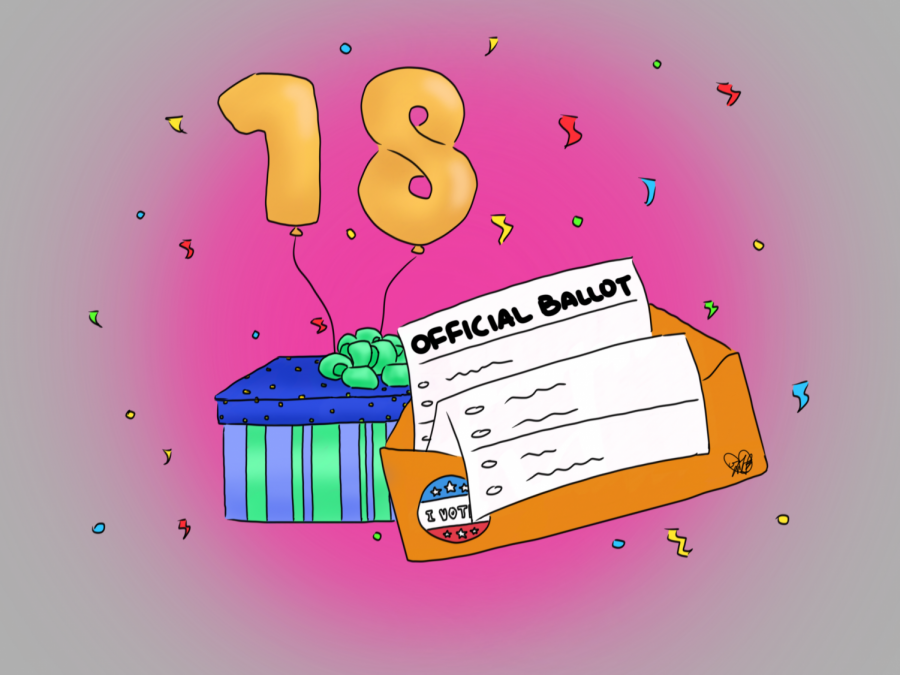The Importance of Voting and How To Get Involved in Politics If You Are Under 18
October 30, 2020
In 1776, voting was controlled by individual states and only white males over the age of 21 were allowed to vote. Gradually, more and more marginalized groups obtained the right to vote. While not everyone has the right to vote in America—for example, if you are not a legal citizen or been disenfranchised due to a felony—if you do, make sure your voice is heard! Now, through a long history of gaining more rights to vote, voting is a crucial aspect of the American electoral process.
If you are 18, you may be wondering, “when the Electoral College ultimately decides who our next president will be, why is it even important to vote?”
The Electoral College is composed of 538 electors who truly decide who the president and vice president will be for the next four years. These 538 electors, however, are representative of the popular vote. When you vote for the president, you are actually voting for your state’s electors. In most states, there is a “winner takes all” rule, meaning that whoever wins the majority of the popular vote in a certain state gets all of the electors from that state. Therefore, voting is essential if you want your state’s electors to choose your candidate. The Electoral College is therefore not a far distant body of electors, but is rather something you choose as you vote.
It is rare for a candidate to win the popular vote, but not the electoral college vote; however, that is exactly what happened in the 2016 election.
Dean Phillips, a member of the House of Representative from Minnesota’s third congressional district, said, “for a democratic republic, like the United States of America, voting is the fuel of our whole democracy.”
In addition, he stated, “nobody’s vote means more than another person’s vote and that is the beautiful part of America,” and, “ it doesn’t matter your age, your income, your geography—your vote matters.”
Voting is a fundamental pillar of democracy and not voting is giving up your voice. Votes do matter and elections have consequences. If you are 18 or older, make sure to vote in this election.
The majority of the Minnetonka High School community, however, is under the age of 18. So, if you are under 18 and, irritatingly, cannot vote in this upcoming election, there are still plenty of ways you can get involved in politics and, furthermore, the electoral process. Here are just some of them.
Join an Organization That Advocates For An Issue You Care About
Nowadays, there are organizations that advocate for pretty much everything. From climate change to the idea birds aren’t real, you can get involved in the issues you are most passionate about.
Become a Poll Worker
With so many people in the United States trying to vote, polls can get busy and understaffed. You can register to be an election judge trainee at age 16 or 17 and an election judge once you become 18. For this position, you will help the process of voting to run more smoothly. If there are not enough poll workers, then polls will often have to close, causing many people to be unable to cast their ballot. Plus, you get paid.
Volunteer for a Political Campaign
Many campaigns appreciate all the help they can get. You can support a campaign in a couple of ways. Helping out with phone banks is one example. You can get involved with a political campaign by checking a campaign’s website, and most will have space where you can put in your contact information and get involved.
Raise Money for a Campaign
Campaigns will always appreciate more funding, especially as it gets closer to the election. Think creatively and engage with other supporters about your fundraiser.
Help Others Register To Vote
The voting registration process can often be long and a bit irritating. Learn how to effectively register to vote and share your knowledge with others. Help ensure that not knowing how to vote will not prevent anybody from having a say in the electoral process.
Get Involved in School Politics
Especially at Minnetonka High School, there are many opportunities to get involved with politics. Joining an advocacy organization, for example, can help to deepen your understanding of a topic and be engaged. In addition, participating in extracurriculars like Debate or Model U.N. can help in your public speaking skills and knowledge of foreign and domestic policy; both things are essential if you want to pursue a career in politics or just be more informed. You could also join Breezes and write about the issues you are most passionate about.
Take Classes That Are Politically Orientated
Minnetonka High School provides many classes that are politically orientated, such as AP US Government and Politics or AP Comparative Government. Building a foundation in political terminology can help you to be better prepared for future political involvement.
Ilse Fredrickson, ‘21, said, “I believe it is important for young people to get involved with politics because we will be here in the future and should help to shape policy accordingly.”
As a current high school student, you do have power in the political process of our country.
In fact, Phillips also said, “no age group in this country is better positioned to change the course of our near-term and long-term future than high school students.”
If you are interested in taking a larger part in the political process, make sure to exercise your power in our participatory democracy through one of these ways or, if you are able, vote!






























